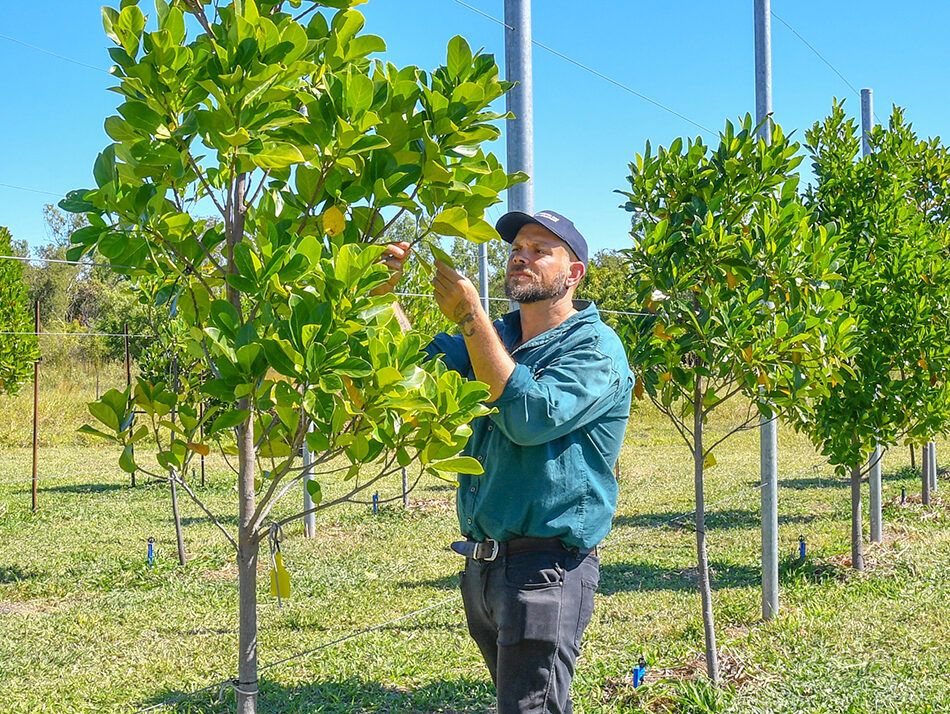A three year jackfruit trial that found the popular Asian delicacy and meat substitute has potential to be grown in Northern Australia was showcased at a recent field day in Kununurra.
The Department of Primary Industries and Regional Development (DPIRD) trial is part of the Cooperative Research Centre for Developing Northern Australia (CRCNA) project spanning Queensland, the Northern Territory and Western Australia.
A WA trial at DPIRD’s Frank Wise Institute of Tropical Agriculture examined trellising alternatives to protect trees from the impact of cyclones and severe weather, as well as improve production capacity and profitability.
Jackfruit trees grow up to 20 metres tall and take up to five years to produce commercial quantities of fruit the size of footballs – typically weighing between five and 15 kilograms.
While fruit may be lost due to the impact of severe weather, trellising may prevent the greater cost of trees being uprooted in the event of a cyclone or storms that frequent the north.
About 80 jackfruit Galaxy variety seedlings, cultivated from seed collected from locally grown trees, were planted in the well drained, alluvial soil at the site.
DPIRD research scientist Mel Ford said the trial compared two trellising systems, palmette and multi-leader, to free standing trees under local conditions.
“Fifteen trees were grown to the palmette training system – angling the branches into the shape of a splayed hand – allowing for space between branches to improve spray penetration and make harvesting easier,” she said.
“Another 15 trees were trained to the multi-leader trellis – pruning the tree below the first wire to encourage multiple branches to climb up the trellis – increasing the number of limbs producing fruit, while protecting the trunk and fruit from sunburn.
“Preliminary results from the trial show the trees using the multi-leader system have a greater mean height and trunk circumference than the trees using the palmette system, with the final analysis of the data set to be completed in coming months.”
The Kununurra trial also examined the potential for clonal propagation, with 30 Rajang trees propagated from cuttings from a tree in Queensland planted at Kununurra in July 2022.
“The survival rate of these trees was well above 90 per cent and they are in good health and growing well,” Ms Ford said.
“The growth rate of the trees has been monitored and the data will be included in the final report to be released in coming months.”
The jackfruit trees were planted at four metre row intervals to explore the potential for high density plantings in tropical environments, as part of complementary research led by the Queensland Department of Agriculture and Fisheries.
The 0.14ha hectare site was irrigated by micro-sprinklers and soil moisture monitoring equipment installed to schedule irrigation.
The research results will be shared and compared with those in the NT and Queensland, where jackfruit orchards are more established.
A similar trial established at DPIRD’s Carnarvon Research Station is in its final year of a three year trial.
The research forms part of the CRCNA project, Demonstrating Next-Generation Resilient Orchard Production Systems for Tropical Crops project, led by the Queensland Department of Agriculture and Fisheries and involves the NT Department of Industry, Tourism and Trade, Manbulloo Limited, Aus-Ex Fruit, the NT Farmers Association and Growcom.
CRCNA Chief Executive Strategy and Engagement Anthony Curro said crop diversification in Northern Australia was crucial to develop an economically sustainable and resilient agricultural sector.
“Jackfruit has excellent potential for commercial production across Northern Australia and is an emerging industry, with the fruit increasingly being embraced as a meat replacement for vegetarian and vegan consumers,” Mr Curro said.
“Research through the three year CRCNA funded project aims to identify opportunities and constraints associated with high-density planting and evaluate production methodologies for planting material – helping de-risk horticultural production for growers.
“Jackfruit have proved to be a versatile crop on which to test new growing techniques to improve production efficiency, providing growers with new growing technologies.”
Media enquires: enquiry@crcna.com.au
Photo: Researcher Eli Staugas inspecting the jackfruit orchard at the Frank Wise Institute of Tropical Agriculture in Kununurra, 19 June 2024.


